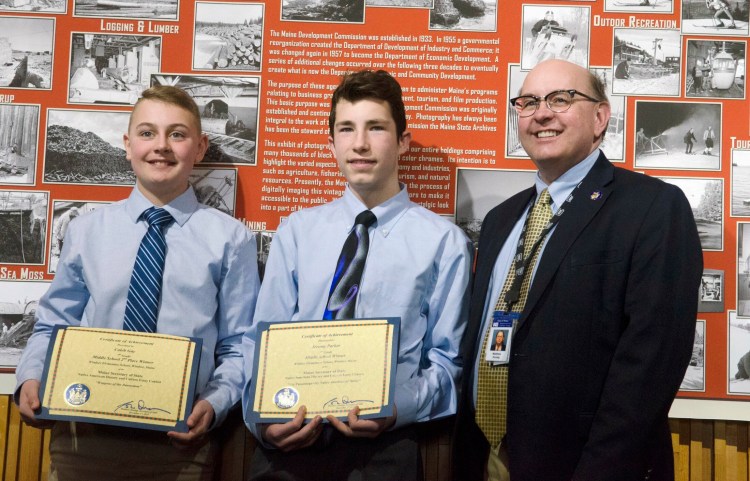AUGUSTA — Windsor Elementary seventh-graders visiting the Maine State Archives Thursday saw meeting minutes recorded during the drafting of the state’s constitution.

Essay contest winner Caleb Gay, center, and other students looks at book held by archivist Sam Howes on Thursday at the Maine Archives in Augusta. Kennebec Journal photo by Joe Phelan
“Now that’s a primary resource,” their Maine Studies teacher, Jana Diket, told them.
Students across Maine participating in the Secretary of State’s Native American Essay Contest gained experience researching in order to write detailed histories of the state’s earliest peoples. The program started around 2007 in order to give young people the chance to learn about Maine Native Americans.
The first and second place winners for the middle school division were Windsor Elementary School seventh-graders Jeremy Parker and Caleb Gay.
Winner Parker wrote “The Passamaquoddy Native American of Maine.” The Windsor 12-year-old was inspired to learn about the people because his grandparents lived near the Passamaquoddy land, and his grandfather taught on the reservation.
“I wanted to learn about those people that my grandfather taught,” Parker said.
His essay halted a common myth that Native Americans live in teepees.
“The Passamaquoddy people lived in wigwams as did most of the Wabanaki people …,” Parker wrote. “The Passamaquoddy Tribes normally did not move around much so they could build these sturdy shelters.”
His father, Josh Parker said his family was very proud of his son.
“He showed us early drafts, and we saw how it came together,” Josh Parker said.
Second place winner Gay wrote “Weapons of the Dawnsmen,” an essay rich with detail describing weapons of Maine Native Americans, including bows and arrows, the atlatl or spear-thrower, and the root war club.
The Windsor 12-year-old chose the topic because he has a growing interest in weapons.
“I love to make stuff and build things,” said Gay, who recently learned that his grandfather was part Native American.
The essay started with a narrative that took readers to a time before black powder, and into the mind of a hunter.
“If I slay this deer, I would possess enough antlers to make myself a new knife, more spear points and more arrowheads,” wrote Gay.
Gay’s mom, Laura Gay, said he has a big interest in writing and history.

Archivist Sam Howes shows Windsor Elementary School students items from the collections on Thursday at the Maine Archives in Augusta. Kennebec Journal photo by Joe Phelan
Diket and writing teacher Helen Beesley worked together on the curriculum, Diket teaching Native American history, while Beesley taught writing. The students researched, drafted, workshopped and drafted again, until their essays were ready for submission.
Parker and Gay were presented awards by Secretary of State Matthew Dunlap at the Maine State Archives. Parker, Gay and their classmates saw original exhibits, including Native American records at the archives, and they observed toured the State House and observed a session.
The winner of this year’s high school division was Samantha Siemling, a 15-year-old sophomore from Dover-Foxcroft attending the Maine Virtual Academy in Augusta.
Siemerling wrote “Indigenous Arts of Maine Native Americans,” an essay that described the intricate art of Maine tribes. She explained how wampum beads were used as authority and currency with European colonists.
“A messenger would be given a string of wampum beads as proof he was authorized to deliver that message,” she wrote.
“I learned how (Native Americans) took art and put it into the regular things they would do, like basket-making,” Siemerling.
“Samantha is a prolific writer, she’s always writing and enjoying it,” Siemerling’s mother, Margaret Siemerling, said.
She was proud that during the drafting experience, Samantha was learning to take constructive criticism.
“There was a time when she wouldn’t want to do revisions,” Margaret said.
Maine Virtual Academy social studies teacher Kristen Tripp said Siemerling was the only student from the academy to write an essay this year. She proposed the idea to Tripp, and they drafted the essay together.
“Samantha creatively goes above and beyond on many of our assignments,” Tripp said.
Siemerling and her family have also been invited to tour the archives, and is making plans to visit, her teacher said.

Archivist Sam Howes shows Windsor Elementary School students a military log book entry about wearing black armband after death of George Washington and other items from the collections on Thursday at the Maine Archives in Augusta. Kennebec Journal photo by Joe Phelan
Dunlap said Thursday that he appreciates the amount of material that students have now that he didn’t have as a child. While a member of the Wabanaki State Child Welfare Truth and Reconciliation Commission, he said, “We had no idea what was happening to our native peoples.”
While on the commission, he reflected on what he knew as a child. He learned about Native Americans at age 5 or 6 by watching “Gunsmoke” and “Bonanza” on television.
“I was actually afraid to go in the woods,” Dunlap said. “(His generation was) a victim of cultural dogma of the time that was very racist and stylized.”
He sees the essay contest as “an opportunity to bring young people at a much earlier age awareness of who these native peoples were and are.”
Abigail Austin — 621-5631
Twitter: @AbigailAustinKJ
Send questions/comments to the editors.




Success. Please wait for the page to reload. If the page does not reload within 5 seconds, please refresh the page.
Enter your email and password to access comments.
Hi, to comment on stories you must . This profile is in addition to your subscription and website login.
Already have a commenting profile? .
Invalid username/password.
Please check your email to confirm and complete your registration.
Only subscribers are eligible to post comments. Please subscribe or login first for digital access. Here’s why.
Use the form below to reset your password. When you've submitted your account email, we will send an email with a reset code.